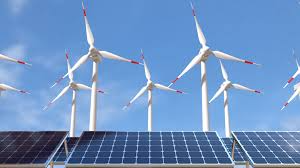Renewable energy sources, such as solar, wind, hydroelectric, and biomass, play a pivotal role in addressing global energy challenges while promoting sustainability and reducing carbon emissions. As technology advancements continue to drive innovation in renewable energy generation, storage, and distribution, these sources are increasingly becoming integral to the transition towards a cleaner and more sustainable energy future. This article explores the advancements, benefits, challenges, and future prospects of renewable energy.
Advancements in Renewable Energy Technologies
- Solar Power: Innovations in photovoltaic (PV) technology have improved efficiency and reduced costs, making solar energy increasingly competitive with conventional fossil fuels. Advancements include thin-film solar cells, bifacial panels, and integrated solar roofing solutions that enhance aesthetics and energy capture.
- Wind Energy: Technological advancements in wind turbines, such as taller towers, larger rotor blades, and advanced control systems, have increased energy capture efficiency and expanded the geographical range for viable wind farms. Offshore wind projects are also gaining momentum for their higher wind speeds and reduced visual impact.
- Energy Storage Solutions: Development of grid-scale battery storage systems, pumped hydro storage, and emerging technologies like hydrogen storage and flow batteries enable better integration of intermittent renewable sources into the grid, enhancing reliability and stability.
Benefits of Renewable Energy
- Environmental Sustainability: Reduces greenhouse gas emissions, air pollution, and environmental degradation associated with fossil fuel extraction and combustion, mitigating climate change impacts and improving air quality.
- Energy Security and Independence: Diversifies energy sources and reduces reliance on imported fossil fuels, enhancing energy security and resilience to supply disruptions while promoting local economic development through renewable energy projects.
- Job Creation and Economic Growth: Generates employment opportunities across the renewable energy value chain, including manufacturing, installation, operation, and maintenance of renewable energy infrastructure, stimulating economic growth and investment.
Challenges in Renewable Energy Adoption
- Intermittency and Grid Integration: Addressing challenges related to the variability of renewable energy sources (e.g., solar and wind intermittency) and integrating fluctuating generation patterns into existing power grids without compromising reliability or stability.
- Cost Competitiveness: Achieving cost parity with conventional fossil fuels and addressing upfront investment costs for renewable energy infrastructure through technological innovation, economies of scale, and supportive policy frameworks.
- Infrastructure and Land Use: Overcoming logistical challenges in developing renewable energy projects, including transmission infrastructure expansion, land use conflicts, permitting processes, and community acceptance.
Future Prospects of Renewable Energy
- Technological Innovation: Continued advancements in renewable energy technologies, including next-generation solar cells, floating offshore wind platforms, advanced energy storage solutions, and smart grid technologies, to further improve efficiency and reduce costs.
- Policy Support and Market Growth: Increasing adoption of renewable energy targets, incentives, carbon pricing mechanisms, and regulatory frameworks to accelerate investments in clean energy infrastructure and drive market competitiveness.
- Global Energy Transition: Transitioning towards a more decentralized energy system with distributed generation, community-owned renewable energy projects, and innovative business models that empower consumers to participate in the energy transition.
Conclusion
Renewable energy is a critical component of the global energy mix, offering sustainable solutions to energy security, environmental stewardship, and economic prosperity. While challenges such as intermittency, grid integration, and cost competitiveness persist, ongoing advancements in technology, supportive policies, and market-driven innovations are paving the way for a renewable energy future. By prioritizing investments in research, development, and deployment of renewable energy solutions, governments, industries, and communities can accelerate the transition towards a resilient, low-carbon economy and ensure a sustainable energy future for generations to come.
